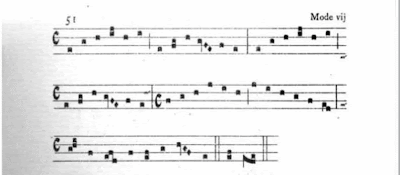From the YouTube page:
The English Tudor period composer John Sheppard's "Laudem dicite Deo" was composed as a respond to be given at First Vespers on All Saints' Day
Text: Latin
Laudem dicite Deo nostro omnes sancti eius,
et qui timetis Deum, pusilli et magni:
quoniam regnavit Dominus Deus noster omnipotens.
Gaudeamus et exsultemus et demus gloriam ei.
Genus electum, gens sancta, populus acquisitionis,
memores memorum laudate Deum.
Gloria Patri et Filio et Spiritui Sancto.
English Translation
Speak praise to our God, all you who are his saints,
and all who fear God, both small and great:
for our Lord God almighty is king.
Let us rejoice and exult and give him glory.
O chosen race, O holy nation, O you people who are his,
be mindful of God and praise him.
Glory be to the Father and to the Son and to the Holy Spirit.
The text comes from Revelation 19 and 1 Peter 2:9.
The first part of the respond, Laudem dicite Deo nostro omnes sancti eius, et qui timetis Deum, pusilli et magni: quoniam regnavit Dominus Deus noster omnipotens. Gaudeamus et exsultemus et demus gloriam ei, existed as an antiphon used on All Saints' Day in various places (and in the Antiphonale Sarisburiense); see the Cantus database for a listing of some of these. Here's an image of the chant score there - from, it says, Augsburg in around 1580:
This is coded "V2" at that site; I'm assuming this is 2nd Vespers - but I've found this antiphon used at Lauds and Matins as well, in other sources.
I'm interested in learning more about what Sheppard was up to in writing this as a Vespers "respond." It's incredibly beautiful - Sheppard is quite amazing, in my opinion! - but would like to understand how it was used; responsories are sometimes used today as processionals. He lived, of course, during the time of the English Reformation and the writing of the first Book of Common Prayer.
There's quite a bit more about Sheppard here at this Hyperion Records page. His works, apparently, had been lost for a long time, and there's not much known about him even now, except that he was "appointed informator choristarum at Magdalen College, Oxford, in 1543, and that he was a Gentlemen of the Chapel Royal in the 1550s." The article also notes that "With the exception of a handful of works for the Anglican church, Sheppard’s surviving output consists entirely of Latin music for the Sarum rite: Masses, responds and hymns."
I will try to find out more about this piece. Meantime, enjoy it for All Saints' Day - in my view, one of the greatest feasts of the year.
Here's The All Saints Day Office.














